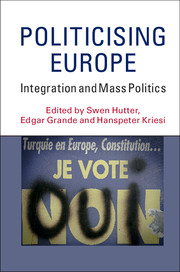Book contents
- Frontmatter
- Contents
- List of figures
- List of tables
- List of contributors
- Preface and acknowledgements
- Part I Theory and methods
- Part II Mapping the politicisation of European integration
- Part III Driving forces and consequences of politicisation
- Part IV Conclusions
- 11 Conclusions: the postfunctionalists were (almost) right
- Methodological Appendix: measuring politicisation, benchmarks and data
- Bibliography
- Index
11 - Conclusions: the postfunctionalists were (almost) right
from Part IV - Conclusions
Published online by Cambridge University Press: 05 March 2016
- Frontmatter
- Contents
- List of figures
- List of tables
- List of contributors
- Preface and acknowledgements
- Part I Theory and methods
- Part II Mapping the politicisation of European integration
- Part III Driving forces and consequences of politicisation
- Part IV Conclusions
- 11 Conclusions: the postfunctionalists were (almost) right
- Methodological Appendix: measuring politicisation, benchmarks and data
- Bibliography
- Index
Summary
Introduction
The empirical analysis in this book represents the most comprehensive effort so far to understand political conflict over European integration in all its relevant manifestations. Our study covers more than four decades of European integration from the early 1970s to the most critical phases of the euro crisis in six west European countries (Austria, France, Germany, Sweden, Switzerland and the UK). We examined public debates on every major step of integration in the past four decades; we have investigated the relevance of European issues in every national election in this period; and we have collected data on protest events on European issues since 1995. If there has been a politicisation of the European integration process in the last four decades, we will have observed it!
In the following, we summarise and discuss the main findings in five steps. First, we give a résumé of the level of politicisation and its development. In this context, we check the validity of our general politicisation hypothesis and of the hypotheses on the individual dimensions of politicisation. In a second step, we provide explanations of the pattern of politicisation which we have observed; third, we analyse the effects of politicisation on the structuring of political conflict in Europe; fourth, we investigate the consequences of politicisation for the European integration process; and, finally, we discuss the implications of our findings for integration theory.
In sum, we argue that the politicisation hypothesis as advanced in the scholarly literature needs substantial revision. There is neither a single uniform process of politicisation nor is there a clear trend over time. Rather, European integration must be interpreted as a strategic opportunity for political actors, political parties in particular, to mobilise citizens. Such opportunities to politicise European issues became increasingly common with the intensification of the integration process after the mid 1980s, but they already existed in the 1970s and they have been exploited not only by radical challengers but also by mainstream parties on several occasions. The result is a punctuated politicisation, characterised by significant variation over time, across countries and political arenas. This pattern may be interpreted as a result of the dynamic interplay of strategies of politicisation and de-politicisation. Although these findings do not fully support postfunctionalist integration theory, they are compatible with most of its assumptions.
- Type
- Chapter
- Information
- Politicising EuropeIntegration and Mass Politics, pp. 279 - 300Publisher: Cambridge University PressPrint publication year: 2016
- 37
- Cited by

